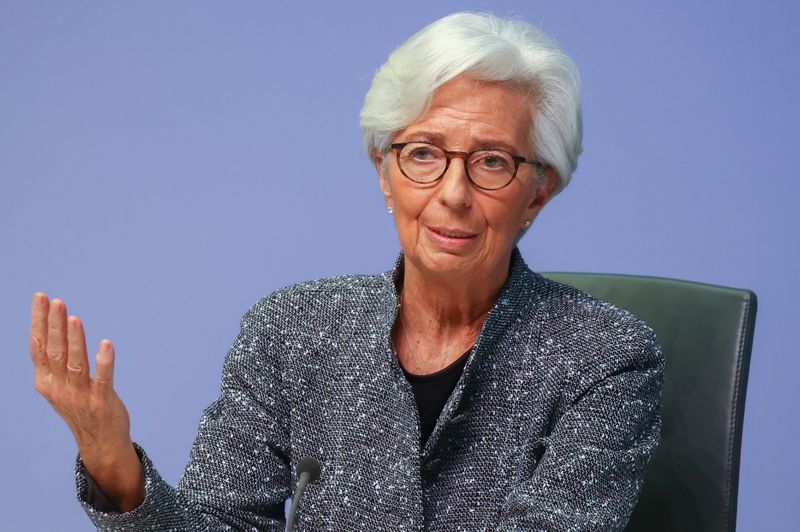By Balazs Koranyi, Francesco Canepa and Frank Siebelt
FRANKFURT (Reuters) - The European Central Bank rolled out yet another stimulus package on Thursday to help fight off the coronavirus pandemic but kept some of its powder dry, putting the onus firmly on governments and sending markets into a tailspin.
Warning that Europe faced a "major shock" which would disrupt life, ECB chief Christine Lagarde offered a range of liquidity facilities aimed at businesses, which are likely to be hit hard by coronavirus, in the hope of mitigating a crisis that could plunge the 19-country euro zone into recession.
But unlike its U.S. and UK counterparts, the ECB held back on cutting rates and sources close to the discussion said that a cut was not proposed on Thursday, even though markets had fully priced in a move.
Instead, Lagarde pointed the finger at euro zone governments, who have been slow in ramping up spending, and rattled markets by signalling that it was not the ECB's job to fight the recent surge in the borrowing costs of some weaker euro zone members.
"I'll tell you what I'm worried about: it would be the complacency and the slow motion process that would be demonstrated by the fiscal authorities of the euro area in particular," Lagarde told a news conference.
"I don't think that anybody should expect any central bank to be the line of first response. It's fiscal first and foremost," she added.
With millions of people in lockdown, financial markets in freefall and companies struggling, European leaders are working on a fiscal response and hopes are pinned on a Monday meeting of top finance officials in Brussels.
UNDERWHELMED
As part of its measures, the ECB will provide banks with loans at a rate as low as minus 0.75%, below the -0.5% deposit rate and so essentially a rebate, and increase bond purchases by 120 billion euros this year, with a focus on corporate debt.
But investors, who had bet the ECB could cut rates at least 10 basis points and possibly more, were disappointed.
Lagarde also aggravated a market selloff by saying it was not the ECB's job to close the spread between the borrowing costs of various members.
She tried to row back on those comments in a CNBC interview later by saying that the ECB was committed to avoiding any fragmentation as this was hampering its work.
But the damage was done by then. The gap between 10-year German and Italian bonds (DE10IT10=RR) soared to its highest level since June.
"Today's measures are an attempt to tackle market turmoil and support the economy in a targeted manner. Judging from initial reactions, it wasn't enough to tackle the first," ING economist Carsten Brzeski said. "Whether it will be sufficient to support the real economy we'll only find out in a couple of months."
Stocks (STOXX) fell 11% by the close of the day with banks (SX7E) down by over 15% in market moves reminiscent of the 2008 global financial crisis.
But the euro also weakened sharply, a minor relief for the ECB as a stronger currency would further cut inflation, which is already under pressure from crashing oil prices.
Some argued that the ECB's move was as good as a rate cut.
"Some observers may initially view the ECB package as somewhat underwhelming. However, the long-term liquidity injections with a rate 25 basis points below the deposit rate can be seen as a rate cut in disguise," Berenberg economist Holger Schmieding said.
In an unprecedented synchronised move, the ECB's bank supervisory arm said it will let euro zone banks fall short of some key capital and cash requirements, to keep credit flowing to the economy.
"Banks need to be in a position to continue financing households and corporates experiencing temporary difficulties," said Andrea Enria, the ECB's chief supervisor.
On Wednesday, the World Health Organization called the coronavirus a pandemic for the first time.
U.S. President Donald Trump meanwhile imposed restrictions for one month on travel to the United States from 26 European countries.
While policymakers insist the financial sector is sound and there will not be a repeat of the 2008 crisis, European stocks (STOXX) have dropped 28% in the past few weeks and safe-haven German bond yields have tumbled to (DE10YT=RR) minus 0.80%.
SPEND, SPEND, SPEND
Lagarde, who has encouraged ECB staff to work from home if they wish to, has repeatedly warned governments that failure to act quickly on the virus could lead to calamity.
European Commission chief Ursula von der Leyen said in a tweet on Thursday that Brussels was working on responses including a "package to prop up the EU economy".
Many economists expect Germany, Europe's powerhouse, to be in recession in the first half of 2020 and some predict a similar turnout for the entire bloc.
While the ECB's stimulus suggests it is keen to help, it has already used up its most powerful weapons in nearly a decade of stimulus. Interest rates are at record lows, it has gobbled up 2.6 trillion euros ($2.94 trillion) of mostly government debt, and has for years offered essentially free cash to banks to keep them lending.
Low rates may also be sowing the seeds of the next crisis as they compress bank margins and fuelling housing bubbles.

